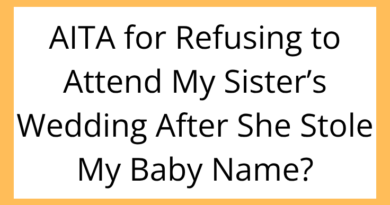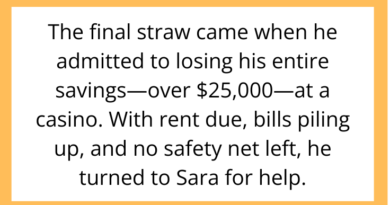AITAH for Refusing to Help My Best Friend Pay for Her Dream Wedding?
When a close friend asks for financial help, it can feel like a test of your loyalty, generosity, and priorities. But what happens when that request crosses a line—and you’re left feeling more like a wallet than a friend?
Today’s AITAH story comes straight from Reddit’s r/AITAH community. It’s a real eye-opener about money, expectations, and what happens when friendships collide with financial boundaries.
Let’s dig into the drama.
The Story: When “Helping Out” Turns Into Funding the Whole Thing

The original poster—let’s call her Emily—shared that she and her best friend, Chloe, had been inseparable since high school. They’d been through everything together—bad breakups, new jobs, cross-country moves—and Emily always thought their bond was unbreakable.
Then Chloe got engaged.
Chloe planned a lavish wedding at an upscale winery. Think designer dress, custom floral installations, and a live band flown in from another state. Her budget? Nearly $80,000.
Shortly after sending out the save-the-dates, Chloe called Emily with an “exciting opportunity to be part of the vision.”
The ask: could Emily contribute $5,000 to help make the dream wedding happen?
The Request: “You Make More Money—You Should Help”

Emily was floored. She’s financially comfortable—she has a stable job and savings—but she isn’t wealthy. She and her partner are saving for a house and possibly starting a family soon.
She politely declined, explaining that while she wanted to be supportive, she couldn’t justify giving away thousands of dollars.
That’s when Chloe’s tone changed.
“You make more money than any of us,” she said. “I thought you’d want to help me have the wedding I deserve.”
Emily reiterated that she couldn’t contribute. Chloe was clearly angry but ended the call curtly.
The next day, Emily received a long text accusing her of being selfish, ungrateful, and a “fake friend.”
Feeling guilty but also bewildered, Emily turned to Reddit to ask: AITAH for refusing to help fund my best friend’s wedding?
Why Reddit Mostly Sided with Emily

The overwhelming majority of commenters told Emily she was absolutely not the villain. Here’s why:
Your Finances Are Your Business
No one—friend or family—has the right to dictate how you spend your money. Just because you’re doing well doesn’t mean you’re obligated to subsidize someone else’s lifestyle.
As one commenter put it:
“You’re not an ATM. You’re a friend.”
Entitlement Is Not a Good Look
Many readers pointed out that Chloe’s expectation was both presumptuous and entitled. A wedding is a personal choice. If you can’t afford a $80,000 event without fundraising from your friends, maybe it’s time to reconsider your plans.
No Means No
Emily was polite and clear in her refusal. Chloe’s reaction—guilt-tripping and name-calling—crossed a major line.
A Few Voices of Sympathy for Chloe

While most supported Emily, a handful of commenters tried to see Chloe’s perspective.
They suggested Chloe might be under intense pressure—either from her family, social circle, or the wedding industry itself—to “keep up appearances.”
Still, even those who empathized agreed that expecting others to foot the bill was not reasonable.
Bigger Questions: Money and Friendship

This situation touches on a broader issue that many of us will face sooner or later: what do you owe your friends financially?
It’s natural to want to help someone you care about. But there’s a difference between picking up dinner now and then—and writing a check for thousands of dollars.
If you do decide to help someone financially, it should come from a place of true willingness—not guilt or fear of losing the relationship.
When a Friendship Becomes Transactional

One of the hardest lessons Emily is learning is that sometimes, money reveals a person’s true character—or at least their priorities.
If your relationship hinges on you paying for someone else’s choices, it may not be as solid as you thought.
And that doesn’t make you the villain. It makes you human.
What Emily Could Do Next
If you ever find yourself in a similar situation, here are a few ideas:
-
Stand firm but compassionate. You can say no kindly but firmly.
-
Offer non-financial support. Help with planning, errands, or moral support.
-
Reassess the relationship. If someone uses money to measure your friendship, it may be time to step back.
-
Set clear boundaries going forward. Don’t leave any room for “maybe.”
The Takeaway: Boundaries Aren’t Betrayal

This AITAH scenario is a great example of why healthy boundaries matter. You are not obligated to fund anyone’s dream wedding, no matter how close you are.
Generosity is wonderful when it’s voluntary—not demanded.
Emily’s story is proof that saying “no” doesn’t make you the villain. It just means you respect yourself enough to draw the line.



